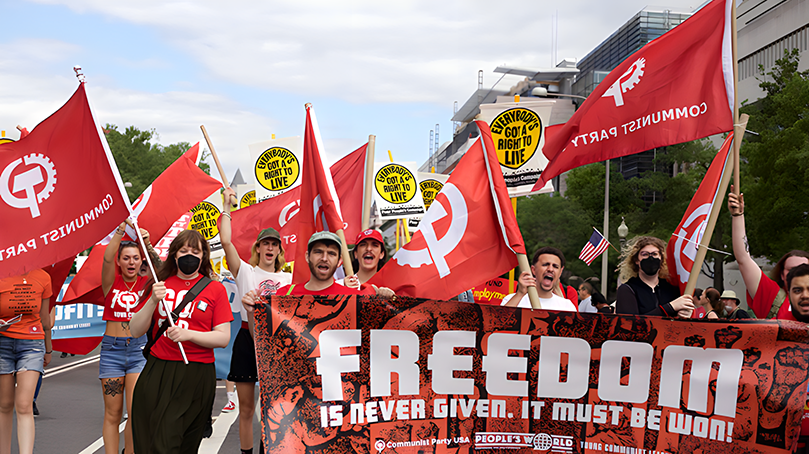
Editor’s Note: Below is the full report by Joe Sims to the CPUSA National Committee on January 14th. Previously an excerpted keynote was published under the title “The Party We Must Become.”
As we meet this Martin Luther King Jr. holiday weekend, the fight against the fascist danger remains front and center. Make no mistake: Trump’s MAGA forces may have been set back, but their eyes remain set on the White House’s door. And they’ve got almost everything they need to unlock it: unlimited dark money; a right-wing media network working overtime; and, most dangerously, a mass movement.
Let’s face it: while damaged, the ex-president remains a force. The MAGA faction of the ruling class and a big chunk of the broader right-wing public still support him. Of course, it’s possible Trump might be replaced by a DeSantis or someone else. But know this: whoever becomes MAGA’s public face and possibly the next president, we should never underestimate the danger they represent. As our party’s program points out, what’s at play here is a grab for control by one section of the capitalist class over all other sections and over society — that’s what January 6th was all about.
The midterms
But they’re missing one important thing in this power grab: a majority of the U.S. people. This was proven once again by the midterms. Outraged by the Dobbs decision, women and men — but mainly women — along with people of color and supported by labor, limited the GOP’s gains in the House. That’s important. But let’s be honest: the GOP victory was a big negative. The Republicans will now act as if they have the largest mandate in history. The far right, as Mr. Gaetz from Florida pointed out, now has the new Speaker of the House Kevin McCarthy in “a straight jacket” — they are now in control. On the other hand, the grassroots mobilization that won the Senate was a big plus. It demonstrated once again that, if called upon, our class and people will respond. Unfortunately, over the last two years they were rarely called upon.
The powers that be seem content to keep the political struggle confined to debates between elite groups inside the Washington Beltway. Unfortunately, some in the small-d democratic movement seem to have accepted that lead. For various reasons, there’s a fear of rocking the boat, particularly with national demonstrations in D.C. during an election year. Could this be the reason that despite the valiant efforts of Rev. Barber, the Poor Peoples March failed to live up to expectations, at least in terms of size?
And consider this: what’s true for demonstrations and elections, is doubly true with regard to strikes. That’s why the Biden administration violated the railway workers’ right to strike; they were afraid of rocking the economic boat.
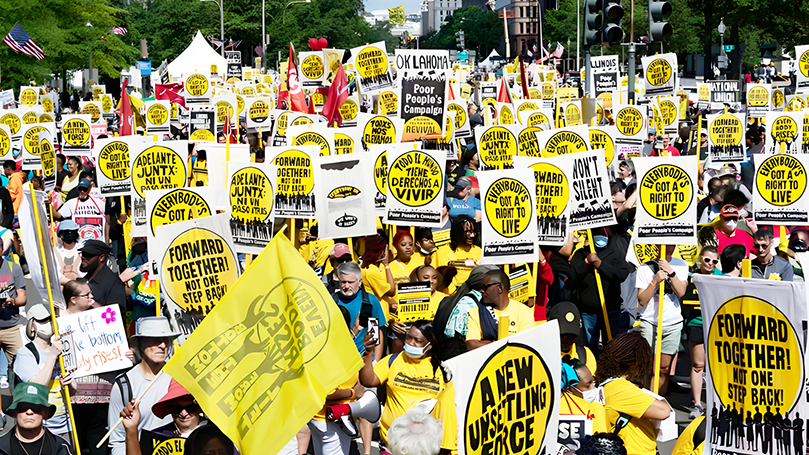
The fight for democracy and the class struggle
It is in these circumstances that the battle to preserve democracy comes face to face with the class struggle. Yes, there’s a fascist danger, and yes, consideration must be given to the risks involved in actions taken by sections of the coalition that are fighting it. But, it’s a big mistake to cede the people’s ability to make demands and compel concessions by tamping down on national protests or forbidding strikes in order to “play it safe.”
The Democratic Party leadership, with one eye cast on the independent vote and the other on their corporate backers, are making political calculations about what they think best serves the national democratic interest. But what’s best for them ain’t necessarily best for us. Why not? What’s best for them is to act in their class interests. They identify their class interest with the interest of the entire nation.
But what they fail to comprehend is that there’s more than one approach to defining national interest — the working class also has the right to express and fight for its vision of what’s in the nation’s interest. Our role is to help define and push that vision forward — that’s our plus. In fact, we believe that the working class’ struggle for democracy, by definition, represents what’s best for the nation as a whole.
It’s gonna take a mass movement
It may be in the interests of the ruling elites to not rock the boat, to not offend bourgeois sensibilities with mass protests and strikes, but the railway workers, women, the LGBTQ community, youth and people of color may not see it that way. A word of caution here: none of the forces arrayed in the people’s front can afford to take an “it’s-my-way-or-the-highway” position — the fascist danger is too grave. The point here, however, is that if you want to win this fight, you’ve got to mobilize your base. It took a mass movement to win the election, and that’s what it’s going to take going forward. Everyone needs to take this into account.
Notwithstanding the talking head’s critique of a lackluster campaign start, Trump and Co. had no compunction in stirring up their base after January 6th. Indeed, they held rally after rally since leaving office, some involving tens of thousands — all told, somewhere close to 40 across the country. Since the coup, they’ve raised hundreds of millions, if not more, in funding. They’ve lobbied, they’ve marched, they’ve threatened, all the while directing their fury at Congress, the new administration, the mass media: everything that seems to stand in their way.
Now, it’s not that the other side sat on their hands; the January 6th hearings were extremely important. They certainly helped shape the debate and turn the tide. But “air wars” are not enough; they have to be coupled with “battles for position” on the ground. Build Back Better, the child tax credit provision, and the changed composition of the NLRB were all positives; but the lack of mass, demonstrative public pressure to get them passed proved their undoing. The successful pro-union change in the Labor Board was the exception.
Some have already learned this lesson as the re-election victory of Senator Raphael Warnock in Georgia demonstrated. For over a decade, voting rights activists there have been registering voters door-to-door (over one million doors were knocked on) and organizing the turnout. They decided some time ago to break with politics as usual. Others are beginning to take notice — in Wisconsin and a few other places, for example. Things seem to be shifting nationally as well. Twenty states and the District of Columbia have approved automatic voter registration. Other states are planning to follow suit.
Needless to say, the stakes are extremely high. The mass movement of the MAGA right can only be defeated by a militant counter mass movement. In this regard, no one should have illusions that the Biden administration is going to lead this effort. Even if it was willing, such a role is not in keeping with the nature of the U.S. presidency. And neither will the Democratic National Committee lead such a movement, though forces within its orbit would certainly play a role.
Rather, it’s what we call the “forces of independence” those organizations and movements who rely on their own resources and make their own decisions — that are key to moving forward. This includes trade unions, religious institutions, student groups, along with civil rights groups and women. Why is this so? Because they are largely beholden to no one except their respective constituencies. Their very independence makes them less susceptible to pressure and therefore have greater ability to take action.
Now’s the time to think through our contribution to this movement-building work, that is, on how we can strengthen the People’s Front. That includes making plans for how to get involved in voter registration, ballot initiatives, and election campaigns supported by coalition partners. And yes, it also means giving consideration to fielding our own members as candidates. Here’s a radical idea: let’s stop talking about it and take some steps. The Michigan District is organizing a meeting with comrade Tony, to discuss what it takes to run a campaign. That’s a great idea! Other districts might consider following their example.
The working class and the road ahead
The road ahead, without a doubt, is going to be challenging. A recession is coming, and corporations have already started layoffs. Salesforce cut 10% of its workforce. Amazon shed 18,000 jobs, Google 12,000, and Microsoft 10,000. McDonalds also announced cutbacks.
It’s still winter, but the class struggle has already started to heat up. In New York, 7,000 nurses hit the bricks and won important gains for patient safety, wages, and working conditions. In March, union contracts expire for 5,000 Caterpillar workers. Illinois get ready! Two hundred thousand postal workers’ contracts are up at the end of May. And get this — the contract for 340,000 workers at UPS is coming up July 31, and the Teamsters are saying to hell with concessions. They’re ready to strike. Then in September, contracts at the Big Three automakers expire for 150,000 autoworkers. Getting rid of the two-tier wage system is a big issue for the UAW.
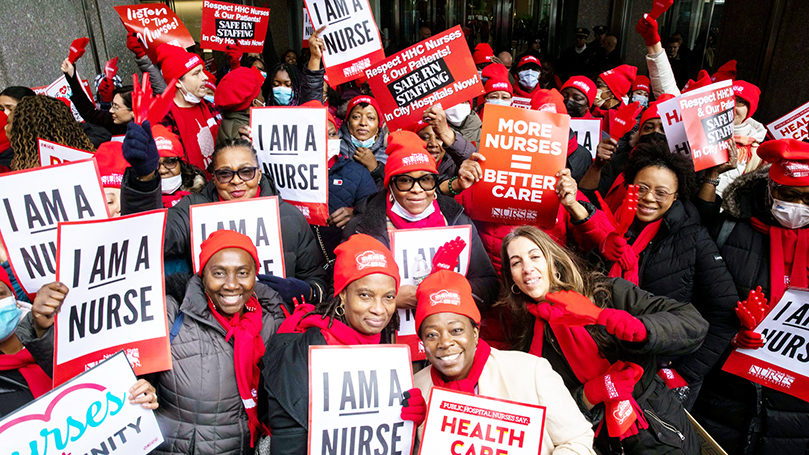
This may well be the year of the strike, in keeping with an overall rise in working-class militancy. Last year, some 78,000 workers hit the picket lines in the first half of the year, compared to 26,000 the year before. We should be ready to hit the picket lines with them. In this regard, the Twin Cities club of the party has provided a real model for ongoing strike support. Current and upcoming strikes and organizing drives are regularly posted in the club’s Signal chat, and members are organized to join the lines with coffee, donuts, and even a few pizzas. And they’re doing this on a regular basis. But the comrades don’t leave it there. Photos are taken and shared and articles are written for Peoples World. Some of the strikers were talked to about attending the recent district school.
Railway workers’ struggle
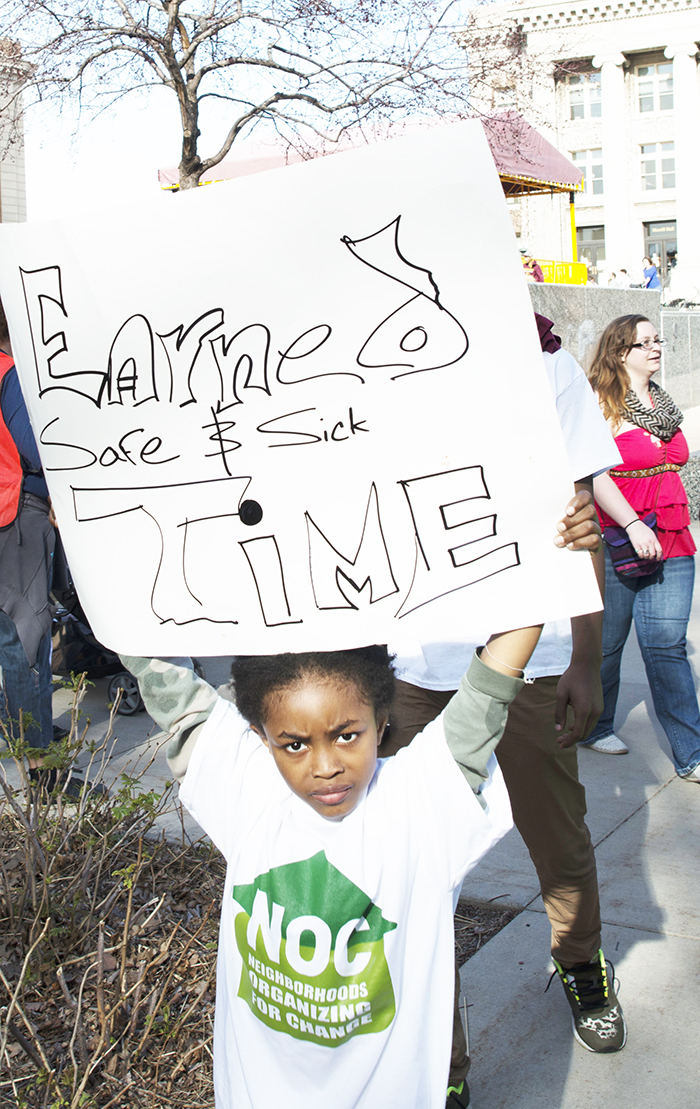 Speaking of strike support, the railway workers’ demand for greater control over their schedules and sick days has not gone away. In fact, the right to sick days is an issue for the class as a whole. One in five workers are without any sick leave at all — that’s about 33 million people, and it affects non-union low wage workers the most. In December, 70 members of Congress with the expressed railway workers’ union support called on Biden to use the levers of government to provide sick days by Executive Order, as well as changes in work rules. We must continue to work with others to support these efforts.
Speaking of strike support, the railway workers’ demand for greater control over their schedules and sick days has not gone away. In fact, the right to sick days is an issue for the class as a whole. One in five workers are without any sick leave at all — that’s about 33 million people, and it affects non-union low wage workers the most. In December, 70 members of Congress with the expressed railway workers’ union support called on Biden to use the levers of government to provide sick days by Executive Order, as well as changes in work rules. We must continue to work with others to support these efforts.
The railroad corporations, on the other hand, remain fiercely opposed to granting the union’s demand. The reason is clear: objectively it would mean greater worker control, a key issue in the class struggle as the Party program points out: “The aim of working-class struggle,” it says, “is to subordinate capital to the will of labor.” Control over the schedule would be a small, but important step in that direction. Winning sick days would also mean shortening the work week, requiring companies to do additional hiring — that’s one thing they don’t want to do. If you think about it, a shorter workweek is an advanced economic demand and would affect the corporate bottom line.
Speaking of advanced demands, the call for nationalizing the industry, voiced by some union leaders, is the way to go, even if its achievement remains far down the road.
The struggle for equality front and center
While the class struggle burned red hot, the demand for equality was also at the center of the fire in recent months. In response to alarm at the Dobbs decision, a marriage equality bill was signed into law at the White House in December. This was an important preemptive measure against a potential right-wing attempt to rescind the right to marry. And there’s real reason to worry; the far right has also pledged to step up their attack on trans rights. This attack must be met head on.
Suits pending before the Supreme Court are also of great concern. At the top of the list are cases involving college admissions for Black and Latino students. These affirmative action cases will be decided in June, and it’s likely that they’ll be banned.
Immigration is another huge issue before the court. When the White House tried to get rid of the Trump-imposed Title 42, which prohibited immigrants, including asylum seekers, from entering the country, the Supreme Court blocked it. Legal arguments will be heard by the Court on Title 42 in February.
Thus, top priority must be given to the struggle against, anti-black, anti-immigrant, anti-Latino and anti-Asian racism in the coming period. Employing the canard of reverse racism, the right has levied a fierce ideological assault on affirmative action for decades. Public support for the measure is mixed with some polls showing broad public support and others considerable opposition. In polling, much depends, of course, on how questions are posed. However, the diverging findings themselves, given the sharpness of the attack, indicate that public opinion remains fluid. As the June date approaches, the party and YCL should keep our eye out for planned protests and help initiate them where possible. This is a huge issue for Black and Latino students, and it should be given every support. An essential part of our ideological role will be to help make the argument for not only maintaining, but broadening the programs and countering the reverse racism argument.
Indeed, the fight for African American equality remains at the center of the country’s debate. As proven time and again, social progress is impossible without addressing it. In this regard, the ongoing battle against racist policing must have our complete attention. Police murder has set new records since the killing of George Floyd, notwithstanding the huge protests following his public lynching. In 2021, this amounted to over 1,055 persons, the highest number in 7 years. Last year, 1,061 were killed. African Americans are killed at a rate nearly 3 times that of whites. Despite these horrific figures, calls for police reform have fallen on deaf ears. Instead, demands to transfer funding from policing to social needs, sloganized as “defunding” have been successfully caricatured and used to significantly increase police budgets, supported by both parties. The modest George Floyd Policing Act, which would have created a national registry to monitor complaints of misconduct, predictably went nowhere in Congress.
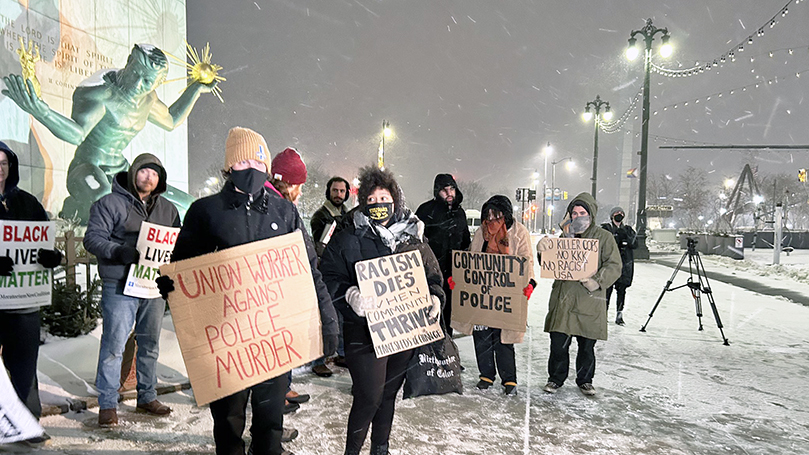
Importantly, progress has been made, however, in advancing the demand for civilian control of police departments, particularly in Chicago. There, a city commission was established by the Board of Alderman after an outstanding campaign led by the National Alliance Against Racism and Political Repression. Chicago’s Empowering Communities for Public Safety Ordinance creates a three-person District Council in each of the city’s 22 police districts. It will be elected in a few weeks in February, and we encourage comrades to go to Chicago and assist in the campaigns’ final days.
Women’s equality
Comrades, January 22nd marks the 50th anniversary of Roe: the Supreme Court decision establishing women’s right to abortion care. The coup caucus celebrated it this week by passing an anti–abortion rights bill. Reveling in the Dobbs decision and the GOP House victory, Republicans are now calling for a complete federal ban on abortion.
Now some 20 states are expected to implement bans. However, the fight is far from over. Recently, the Biden administration and the FDA approved making abortion pills more widely available — a really important development. In the coming year, NARAL, Planned Parenthood, and others plan ballot initiatives in 10 states, among them Arizona, Florida, Ohio and Missouri. Clearly, we should get involved in these campaigns in every way possible, including signature gathering.
This should not be seen as a “women’s issue.” What fighting racism is to the battle for equality for people of color, combating male supremacy is to women’s equality. We need to convince our male comrades that it is their special responsibility to champion the fight for reproductive rights. And the reality is that many of us don’t get it. A case in point: in a few instances, some comrades declined to participate in pro-choice marches because, they said, the actions were initiated by what they called the “bourgeois” women’s movement. Can you imagine? Hundreds of thousands of women in the streets around the country, fighting for the most basic of democratic rights, and some of us refused to participate!
We’ve got to deepen our understanding of the Marxist approach to women’s equality. The oppression of all women is a product of the early rise of classes; the oppression of all women is organically linked to the rise of class oppression. The capitalist class benefits from the oppression of all women through the promotion of cultural and social inequality, domination, and control, including the active cultivation of misogyny. Capitalism also benefits from the exploitation of working-class women where extra profits are reaped through lower wages and the so-called second shift where working-class women also engage in various forms of unpaid labor. This is the basis of the sexist social division of labor. Women of color also face exploitation based on race and nationality, resulting in three forms of oppression under capitalism: class, gender and race.
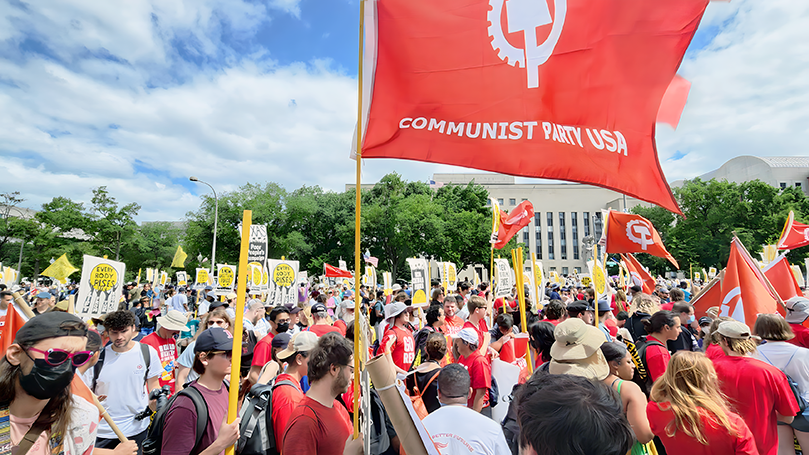
This requires all working-class forces to increase their capacity to demonstrate a conscious understanding of, and allegiance with, all women in the democratic fight for full equality. This means, for example, confronting sexual harassment in all areas of life. It means confronting the horror of domestic violence. It means understanding, and responding to, the challenges working-class women face in a legal system arrayed against them. Unable to afford attorneys, women and their dependents are at the whim of Children Services Departments and are often without assistance in navigating the legal bureaucracy. Tragically, children end up being removed from the home, which, in the case of African American and Latino families, is twice the rate of their white counterparts. The cruel irony is that children end up in foster care where the state subsidizes their care, when no such support exists in their previous homes.
Thus, whether it be abortion rights, sexual harassment, unequal wages, racial discrimination, domestic violence, or glass ceilings, the political movement that arises to confront these inequalities — like the population it represents — is therefore multiclass. Our role is not to stand on the sidelines and critique it, but to close ranks and throw ourselves into the battle for complete equality for all women. Do we champion the issues confronting working-class women and women of color in the process? Of course we do. That’s our plus. But we don’t do it from the curb; we do this from the middle of the street where the masses have gathered in struggle. And we must work to do so in every case, without exception. As a party of consistent working-class democracy, we have to fight for consistent democratic positions up and down the line.
Consistent working-class democracy
All of this argues for updating and deepening our understanding of the battle for democracy. Such an understanding is vital for moving forward in the present moment, and it’s imperative in the struggle for the socialist future. As our party program makes clear, “The struggle to defend and enlarge democracy in every realm of life is therefore the only path to socialism in our country.” But what is meant by democracy? The GOP far right, Mitch McConnell included, paints anything to the left of Ronald Reagan as a symptom of anti-democratic socialism. The Democratic Party center, not to be outdone, uses the label “authoritarian” to falsely paint left and far-right as alike.
The party’s starting point in discussing democracy must begin with a class definition: democracy as breaking the chains of slavery, upholding the right to collectively bargain, supporting oppressed peoples’ right to determine their destiny, women’s rights, championing the right to vote. Ours is a consistent working-class democracy.
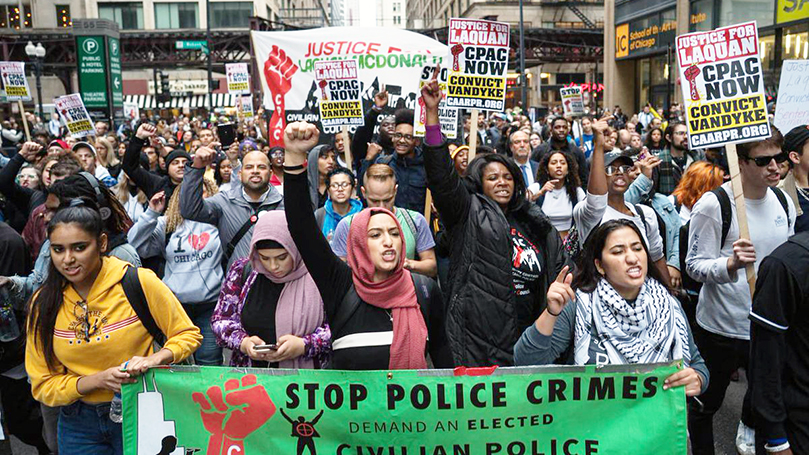
Today we stand four squares for the PRO-ACT, marriage equality, abortion rights, voting rights for immigrants, community control of police and radical reform of the political system. And let’s not forget about economic democracy: the right to control and distribute what we produce, a subject largely off the table in democratic discourse. We support democracy from the bottom up, not the top down. Working-class democracy must rest on the active involvement of the people in the running of the state and economy — that is one of the inescapable lessons we drew from the collapse of socialism in the former USSR and Eastern Europe. Indeed, the lack of deep-going socialist democracy was one of the chief causes of the routing of “really existing socialism” in Europe and Central Asia in the late 20th century.
It’s on this basis that we’ve proudly embraced Bill of Rights socialism, a U.S. model of socialism, based on the best parts of our history, culture and traditions.
Cold War 2.0
In this multipolar world, the main threat to democracy both at home and abroad comes from the most right-wing section of our ruling class. We know who attacked the Capitol on January 6th, 2020 and who, just the other day, hijacked the U.S. House of Representatives. And we know who paid for it; among them were Lockheed, Comcast, and Walmart. And we also know that the U.S. has done more than its part to contribute to the rise in international tensions, and that there’s a two-party consensus for doing so.
Take the situation with China and Russia. The two countries cooperate economically and have a defensive alliance. This is the result not of ideological alignment — nothing could be further from the case — but rather, a perceived self-interest and desire to survive after being encircled, sanctioned and tariffed nearly to death. U.S. imperialism wants to impose its version of what it calls “democracy” — meaning capitalism. It plans to do so by means of economic pressure, or force, or a combination of both. But imperialism’s version of democracy is not the be-all and end-all of democratic practice. Cuba, Vietnam, and Venezuela have chosen different paths. Whether they employ single or multi-party systems, each was born out of their country’s history and the conditions under which their revolutions occurred.
It is not for us in the U.S. to decide which form of government other countries choose. Rather, we must insist on creating conditions under which all are able to make choices, free of outside interference.
Challenges of the peace movement
Creating those conditions means staying the hand of imperialism by building a mass movement for peace. That’s a difficult proposition in today’s circumstances, rendered even more challenging by Russia’s invasion of Ukraine, but necessary nonetheless. Prior to the invasion, voices in the country and in Congress had begun to challenge the sharp right turn in U.S. foreign policy directed particularly at China. Citing the danger posed by global warming and the need for international cooperation, environment organizations joined Bernie Sanders in calling on President Biden to pull away from the administration’s early hostile anti-China posture and find areas for joint action to save the planet. Those hopes were dashed when Russian troops crossed Ukraine’s border in February of last year.
Hawks in the U.S. Congress responded by demanding an even higher defense budget than requested by the administration. Still, half of the Democratic Caucus in the House voted against the addition, which passed with bipartisan support. This sad performance was repeated in December, but this time only 45 Democrats in the House and 4 Democrats in the Senate plus Bernie Sanders voted no.
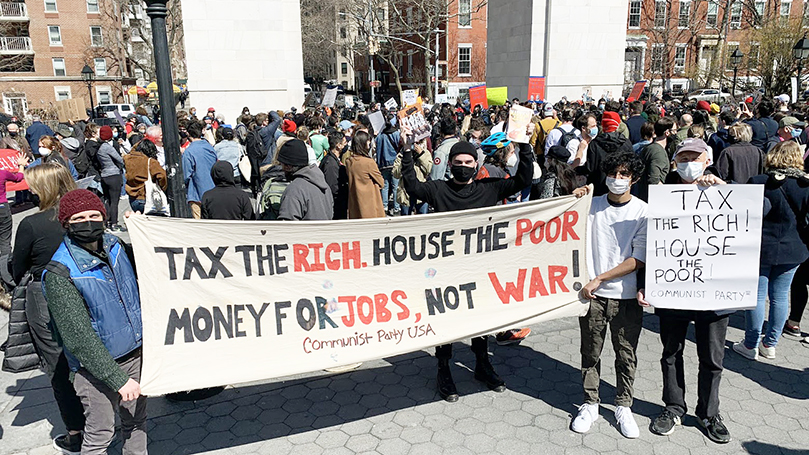
Responses to the Ukraine war have split the U.S. (and world) peace movement in several different directions, with some supporting U.S. policy, others defending Russia, and still others seeing the conflict as a proxy war between both. Our position has been to oppose and condemn the invasion, and call for a cease fire and negotiations. Russia must return to its borders and Ukraine has the right to national sovereignty. NATO must stop expanding. An earlier call for negotiations by progressive Democrats was quickly retracted after strong White House objection. Clearly, there’s a steep hill to climb in rekindling peace sentiment, leading to a revitalization of the peace movement as a whole. A meeting or conference of party peace activists this year will start an important process of thinking through specific steps we can take toward re-energizing our class and people’s longstanding commitment to peace.
While preparing for this conference, we should give thought to how we frame building this vital movement. The peace movement, like the movement to save the environment, or end gun violence, is an all-class movement. In this respect, it is similar though not identical to movements against racism, sexism and homophobia. Marxism-Leninism places these struggles within the category of what we call special questions, special meaning both class and non-class issues must be taken into account. As our party’s program instructs, proper approaches to special questions hang on mastering the relationship between the class struggle and the battle for democracy. What makes peace a democratic question? Simply put, the right to live in a world free of war and the threat of nuclear annihilation, and that this right involves everyone, regardless of what place they occupy in the social division of labor.
When approaching the building of movements involving special questions, it’s essential to take broad approaches, while always keeping working-class interests in the foreground. Remember, we fight for unity around issues, without ideological or political pre-conditions. In building coalitions for peace, this specifically involves thinking through the relationship between fighting for peace and confronting imperialism. Why? Because imperialism is the main progenitor of war in the world today. The fight for peace objectively is a fight against imperialism. However, the movements for peace and the movements against imperialism are not the same.
Peace sentiment is motivated by moral opposition to violence, religious belief, or self-interest in preventing, for example, loss of loved ones, homes, land, freedom or national sovereignty. A peace activist may even be motivated by a simple embracing of peace and tranquility as an end in itself. Opposition to imperialism, on the other hand, involves a higher or deeper consciousness of class and capitalist exploitation on an international scale. It, too, involves moral indignation at repression, at unfair economic practices, or a pronounced democratic belief in not interfering in others’ affairs. This self interest may be economic, as in opposing NAFTA or TPP, or political, as in supporting a workers’ strike in another country.
The point here is that those who support peace, an all-class issue, may not yet understand the need to oppose imperialism, a class issue. As a result, linking the two in building a peace coalition is likely to inhibit its breadth. What then does bringing working-class interests to the fore involve in this situation? Basically, it means pointing out the capitalist roots of war, in other words, raising anti-imperialist consciousness.
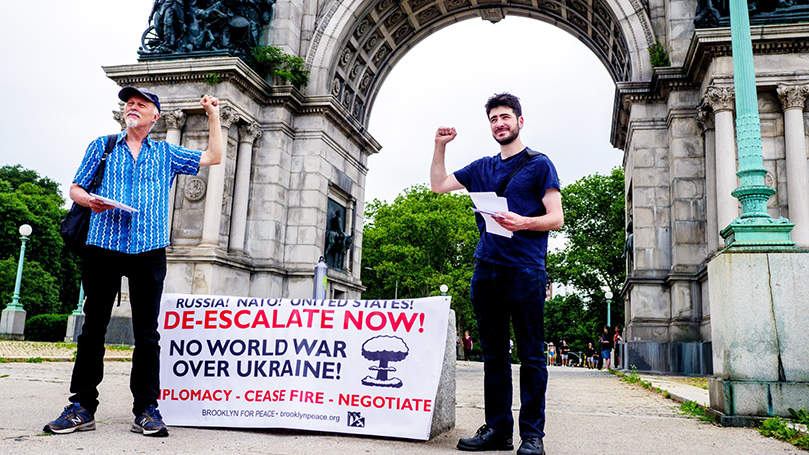
Gus Hall, at the height of the Vietnam War, in a 1968 pamphlet titled “The Road to Revolution,” argued that as we marched with peace forces against the dirty war, our role was to talk with them about imperialism, to raise their anti-imperialist consciousness. He wrote, “When we walk with those who are for peace for other reasons, we must talk about imperialism. Again, we can only do so if we walk with peace marchers who are not yet conscious of anti-imperialism.”
The point here is to talk with people who do not yet agree with us: to raise their consciousness. For this reason, we should avoid framing our objective as building a peace coalition in which support for anti-imperialism is a condition for working together. Why? Again, because we want to work with and convince others. It’s one thing to inject anti-imperialist consciousness into a broader peace movement, but quite another to frame united front work in the peace movement narrowly with anti-imperialist planks as conditions for joint cooperation. The former involves our plus, the latter is likely to paint ourselves into a corner where we influence very few.
Building the party
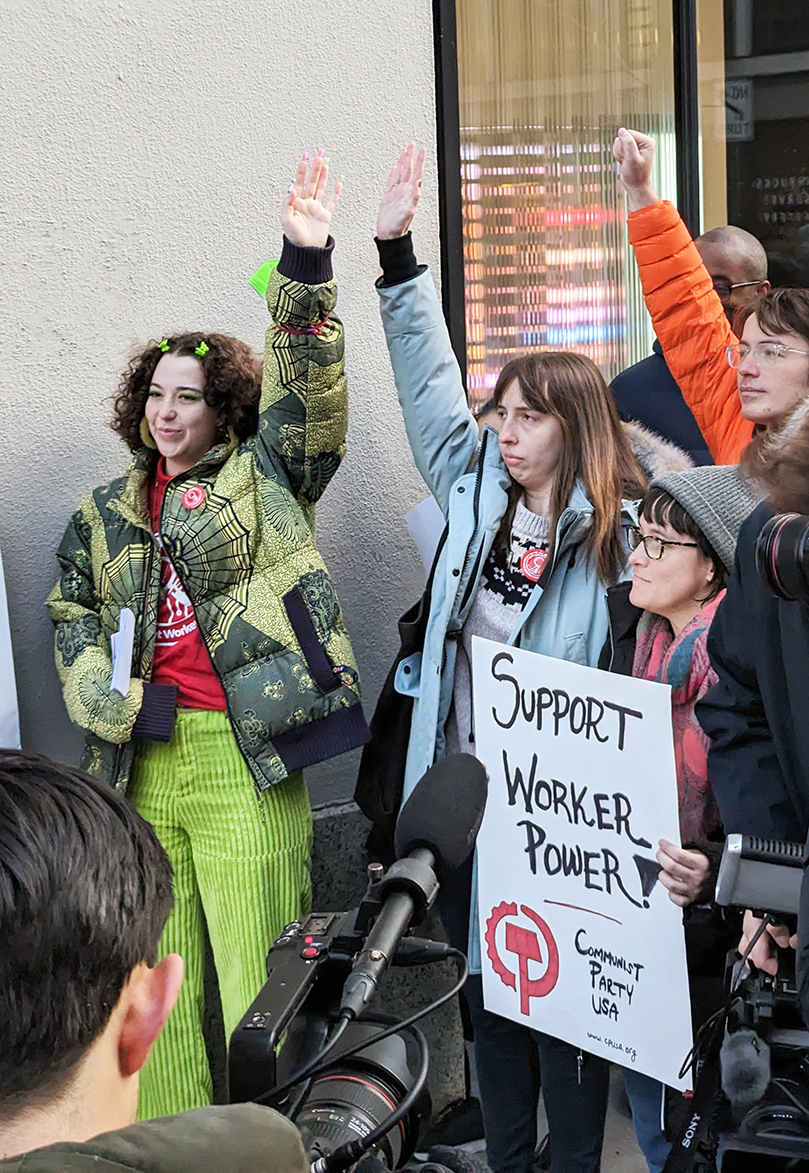 If we carry out our work properly, not only will a stronger peace movement emerge, but so will a larger and stronger Communist Party. Everything is pointing in this direction. Some 6,000 people have applied to join the party over the last two years, one-third of whom are paying dues.
If we carry out our work properly, not only will a stronger peace movement emerge, but so will a larger and stronger Communist Party. Everything is pointing in this direction. Some 6,000 people have applied to join the party over the last two years, one-third of whom are paying dues.
2022 was a very good year. We completed the People’s World’s fund drive, brought close to 400 members to D.C. to participate in the Poor People’s March, were active in the fall election campaign, and established a regular public presence in a number of cities and states. We held regular educational seminars, an online festival for People’s World on May Day, and a well-attended International Conference. Last year, we were able to build multi-club districts in seven additional states. New York, Texas, Southern California, Northern California, Eastern Pennsylvania and Connecticut already had a number of clubs in their states. In another 17 states, single clubs with members scattered around the state were either created or maintained.
A big achievement has been the growth of local YCL clubs in New York, D.C., Ohio, Michigan, Illinois, Massachusetts, Kentucky, Eastern Pennsylvania, and Connecticut. In Kentucky and D.C., there are a couple of clubs located on college campuses. In D.C., we have to congratulate the work of the Claudia Jones School, our first public Marxist school in the recent period. It’s doing an outstanding job in bringing the science of society to the broader public, involving not only our thinkers and activists, but others as well.
Clearly, we are still very much in the rebuilding stage of growing the party. If we were to compare it to building a house, we would have to say while we have a blueprint and have laid a solid foundation, we’re still very much on the ground floor.
For example, we’re still missing layers of trained party leadership in the clubs, districts and nationally. National commissions are needed in several areas of work, but remain unformed due to a lack of comrades able to anchor the work. These problems also affect our ability to grapple adequately with party growth. Here we also have to acknowledge that a considerable section of the new membership have yet to receive an orientation as to our basic principles and concepts. In the next several months, at the initiative of the Education Department, we’re taking steps to remedy this situation. Weekend district schools will focus on the party’s program. The first was held in Ohio earlier in the year, the second in December in Minnesota. Illinois has also recently concluded a course.
While improving, the multiracial and gender composition of the party remains weak. Cis women are joining in far fewer numbers than cis men, though the non-binary and trans membership has grown. In the recent period, the influence of male supremacy has become increasingly apparent, particularly but not only, in online spaces, where men aggressively dominate the conversation, bully, and dismiss women’s opinions. We’ve got to ask ourselves why are these patterns persisting? Why are so few women joining? And after joining, how many are sticking around? What is it about our public presence, both in person and online, that the masses of women are not responding to?
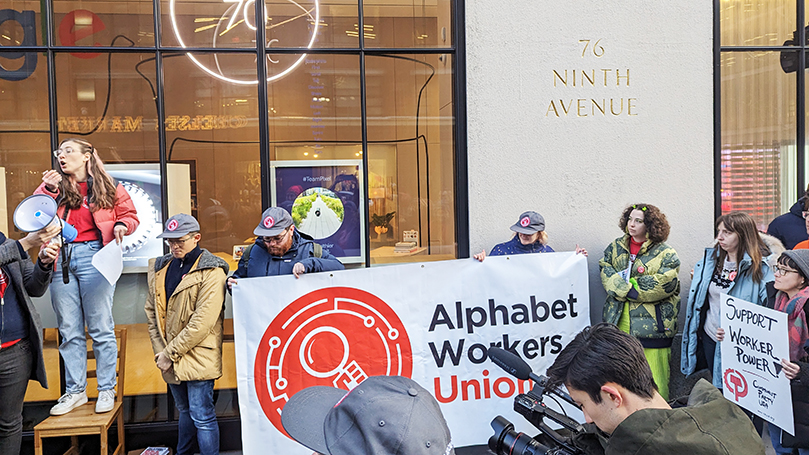
Comrades Rossana, Dee, Rebecca, Lisa, and others will take steps in the next weeks to convene a Communist women’s collective with the aim of holding a conference out of which we hope to form a Women’s Commission. As we move forward and improve our work in this vital arena, we call on our male comrades to examine what we’ve done and haven’t done to contribute to this situation.
At the last convention, we’ve developed a sexual harassment policy, and it’s stood us in good stead. As the party continues to grow, our upholding of respectful and principled relationships, particularly with younger comrades, is a must. Party guidance and mentorship is essential, but in no case should it give license to inappropriate overtures or harassment — that’s deadly, and the damage can be permanent.
CPUSA 2023
Going forward, the NC has a three-fold task: to stay focused on fighting fascist danger; to continue building the party; and to lay the political, ideological and organizational basis for the next convention.
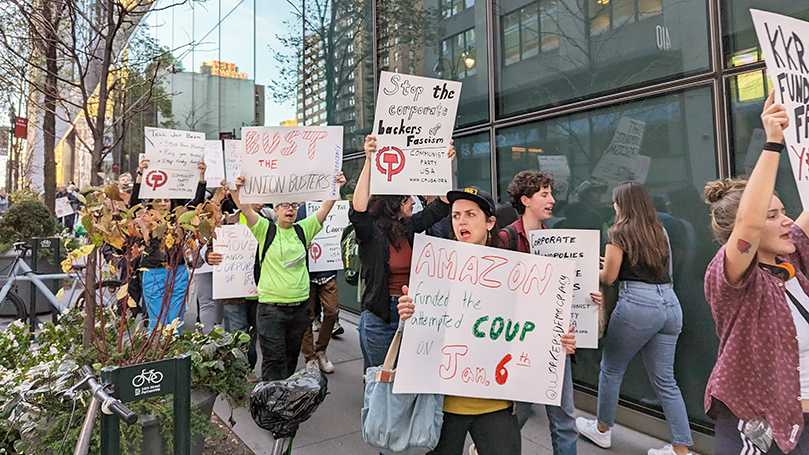
With regard to the fascist danger, our goal must be to expose, organize and take initiative. The PW and CPUSA.org are doing a wonderful job in continuing to shine a spotlight on this threat. Part of our exposé must be to continue to reveal the corporate ties to the coup caucus and its sedition. In NY, the Party helped organize an important protest on the issue, joined by a number of friendly organizations. And speaking of sedition, shouldn’t we actively support a demand to prosecute those responsible? This is too important an issue to leave to the sole discretion of the courts and Justice Department. Are there already campaigns on the issue, petitions, memes, protests? If not, shouldn’t we help initiate?
In the coming year, fighting the fascist danger means staying focused on electoral activity, strike support and union organizing, abortion rights, affirmative action, community control of police, and LGTBQ rights, along with peace and international solidarity.
The year ahead in party building requires maintaining our public presence and developing a more conscious approach to recruitment, both on- and offline. It also means continuing to consolidate organizationally and ideologically.
Fundraising also remains an essential task. Longview has set a $200,000 goal this year — a must do amount to stay in the black. Failure to make that goal is simply not an option.
With respect to the convention, as the summer and fall approach, collectives will have to be established to find a location and propose a date, along with making initial plans concerning resolutions, the constitution, and possibly the party program.
Next year, we’re sure to have a great convention that will help consolidate our current achievements and help lay the basis for the party we want to become: a mass party; a militant party of revolutionary, working-class struggle; a party of initiative that fights for the unity of our class and people. We’re building an anti-sexist, anti-racist, anti-homophobic, anti-fascist party; a party of consistent, working-class democracy and peace. This is a party led by women, by African Americans, Latinos, Asians, Middle Eastern, Native American and working-class white Americans, immigrants, documented and undocumented, straight and LGBTQ.
We are building an internationalist party based on the best traditions of the U.S. people in defending the progressive features of our multi-racial, multinational country, weaving together a mosaic of song and dance, prose and poem, film and play, understanding that the social revolution is a festival of the people. And make no mistake: we are a Marxist-Leninist party of social revolution fighting for an American. model of Bill of Rights Socialism, made in the U.S.A.
Images: CP with the Poor People’s campaign in DC (CPUSA); Poor People’s Campaign in DC (CPUSA); NYSNA members march on the boss January 18 (Facebook); Dinkytown minimum wage march by Fibonacci Blue (CC BY 2.0); Never stop protesting police murder! by Michigan CP (Twitter); CP flag at the Poor People’s Campaign DC rally (CPUSA); CAARPR demonstration in Chicago (Twitter); Tax the Rich House the Poor / Money for Jobs, Not War by NY CP (CPUSA); CP members demanding de-escalation and diplomacy in Ukraine with Brooklyn for Peace by Brooklyn for Peace (Facebook); Support Worker Power by NY CP (CPUSA); Alphabet Workers Union rally by NY CP (CPUSA); Stop the corporate backers of fascism by NY CP (CPUSA)
- Tags:
- abortion
- affirmative action
- Anti-fascism
- Anti-imperialism
- Building the Party
- class consciousness
- class struggle
- Clubs
- Communist Party
- Community control
- democracy
- Elections
- Extreme right
- fascism
- Fundraising
- Immigrant Rights
- imperialism
- LGBTQ rights
- marriage equality
- Marxism-Leninism
- National Committee
- Party Building
- peace
- People's World
- Police violence
- Racism
- sexism
- strike
- Supreme Court
- unions
- voting rights
- women
- working class
- Young Communist League

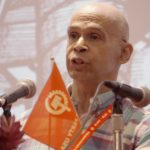
 Join Now
Join Now